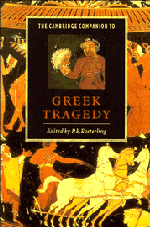6 - The language of tragedy: rhetoric and communication
from Part II - The plays
Published online by Cambridge University Press: 28 May 2006
Summary
In Plato's Republic, when Socrates is describing the imperviousness to fear of the Guardians of his new Republic, he catches himself using rather grand metaphorical terms, and he immediately rebukes himself for speaking tragikos, 'tragically', 'like a tragic character' (4i3b4). Demosthenes, the great orator, dismisses the rhetoric of Aeschines, his opponent, as bombast with the verb tragoidein, 'to play in a tragedy' (which is also a dig at his former career as an actor) (18.13; 19.189). The comic playwright Aristophanes, who repeatedly parodies the language of tragedy, has a character in his play Peace wonder why the hero didn't fly on Pegasus rather than a dung-beetle, and thus appear tragikoteros, 'more tragic', 'more like a tragic hero' (136). Already, in the classical polis, 'the tragic' has become synonymous with a certain grandeur of expression, high-flown periphrasis and even heroic posturing. Tragedy is - and was perceived to be - made up of a particular register of language: there is a style and vocabulary proper to the genre. So how is the language of tragedy to be characterised? There are several types of answer that can be given to this question, that take us far beyond generalisations about the grand and the heroic. What is more, the tragic texts themselves are deeply concerned with how language is (to be) used. This chapter will explore the questions of tragic language.
The first type of answer that can be developed is a formal one. One basic articulation of tragedy is the difference between scenes and choral odes. The scenes are conventionally divided into rhēseis and stichomythia. A rhēseis (plural rhēseis) is a set speech of varying length (rarely more than a hundred lines) in which a figure offers an exposition of his or her position, or a description of an event, or a reflection on events.
- Type
- Chapter
- Information
- The Cambridge Companion to Greek Tragedy , pp. 127 - 150Publisher: Cambridge University PressPrint publication year: 1997
- 11
- Cited by

